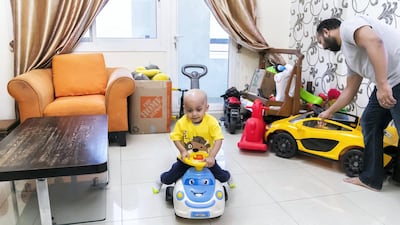Donations have poured in to help a young boy in Dubai battling leukaemia after his mother appealed for help.
Aarev Shetty, 2, is currently enduring painful chemotherapy sessions at Mediclinic City Hospital in the city but continues to fight on through the treatment.
So far, UAE charities have donated Dh164,000 towards his spiralling medical costs, with well-wishers donating a further Dh1,500 to hospital administrative staff after reading his story in The National.
More funds are still needed to help cover his costs, however, which are expect to top Dh700,000 by 2022.
“It is amazing people would think of us at this difficult time,” said his mother, Anu Rai, an Indian hospital worker in Dubai.
“People now believe our story is true, as some thought we were just trying to extort money.
“We can only hope more people feel it in their hearts to help us. The journey ahead is very long.
“It has given us great belief that despite everything happening with coronavirus, people still want to help.”
Baby Aarev was diagnosed with blood cancer in August last year after showing signs of muscle weakness. His parents were initially able to pay for his treatment through their health insurance, but the cost of his care has now exceeded their policy.
So far, Al Jalila Foundation, a UAE non-profit, has donated Dh100,000 for his treatment, while the Friends of Cancer Patients have contributed Dh30,000. The Rahma cancer charity in Abu Dhabi has also donated Dh34,000.
Members of the public can legally contribute to help fund his care if the money is paid directly to the hospital treating the patient.
For more information on how to support the cause, people can contact Ms Rai on Anu_1989radha@yahoo.com
“With the support of our partners and donors we are able to give hope to young patients and help alleviate the financial burden on their families,” said Dr Abdulkareem Al Olama, chief executive of Al Jalila Foundation.
“Nothing makes us happier than to experience the overwhelming joy from parents whose children have regained their health after successful treatment.”
Aarev's father, Sushant Shetty, has been helping his son by donating blood as well as platelets – tiny blood cells that react to bleeding by initiating blood clots.
Ms Rai, 30, from Delhi, said her son's plight had shone a light on the generosity of donors, particularly during a pandemic when many people were reluctant to visit a clinic to give blood.
“Because Aarev is anaemic, he has lost blood so needed a transfusion,” his mother said.
“Doctors said some blood supplies were running low because of coronavirus, as rarer types were harder to get hold of.”
Supplies at Abu Dhabi’s blood bank, which covers 12 government and 25 private hospitals, fell to an all-time low in March due to Covid-19 movement restrictions and a lack of donors.
Reserves are not only vital for leukaemia patients like Aarev, but also to serve accident and emergency wards across the country.
In May, 85 medical staff from hospital group VPS Healthcare donated blood at three hospitals in Al Ain. A similar appeal was launched by Mediclinic, where Aarev is receiving his care.
Further donation days are planned this month, starting at Mediclinic Al Ain Hospital on June 17.
“Mediclinic has arranged a number of blood donation drives across the country in collaboration with the blood transfusion services, for both its staff and the public,” said Dr Pietie Loubser, Chief Clinical Officer, Mediclinic Middle East.

“Participation could literally mean the difference between life and death for someone in need of a transfusion.”
The first campaign ended last Sunday with more than 200 donors participating at eight different locations.
At Bareen International Hospital in MBZ City in Abu Dhabi, doctors appealed for donors to come forward.
“Generally, blood is available, but there is a shortage of rarer blood groups,” said Dr Nazura Siddiqi, a hospital gynecologist.
“This is because the restriction on supply during the pandemic and rarer blood donors are harder to find.
“Negative blood types are rare, as 95 per cent of the population will have a positive blood group.
“If you have a negative blood patient, it is important they get the correct type or they may struggle to create enough antibodies.”
Dubai Health Authority has reassured residents that it continues to be safe to donate blood during the pandemic and has encouraged people to do so.
Members of the public can visit a special blood donation hall at Al Wasl Club in the city if people are wary of going to a hospital where Covid-19 patients may be treated.
Donations can be made every eight weeks, with each donation potentially saving up to eight lives.
Registration via the DHA mobile app takes about 20 minutes.
“We thank all the blood donors who have supported us and continued to donate blood during the Covid-19 pandemic and have responded to our calls and needs,” said Dr Mai Raouf, director of Dubai’s Blood Donation Centre at Latifa Hospital.
“We encourage the community to continue donating blood. We are following all necessary protocols to ensure safety of blood donors, recipients and staff members.”
The next Mediclinic blood donation drive is scheduled as follows:
DUBAI:
Mediclinic Welcare Hospital – June 23
Mediclinic City Hospital – June 29
Mediclinic Parkview Hospital – June 28
Mediclinic Dubai Mall – June 29
ABU DHABI:
Mediclinic Airport Road – July 1
Mediclinic Al Noor – July 2
Timings 9am – 2pm
AL AIN:
Mediclinic Al Ain Hospital – June 17
Mediclinic Al Jowhara Hospital – June 24
Timings 9am – 2pm


